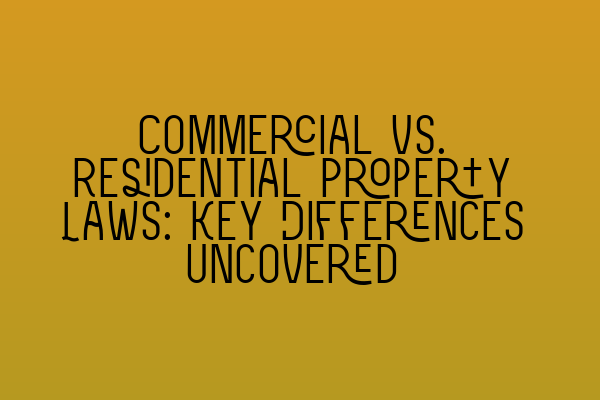Commercial vs. Residential Property Laws: Key Differences Uncovered
When it comes to property transactions, whether buying, selling, or leasing, understanding the differences between commercial and residential property laws is crucial. Each type of property has its own set of rules and regulations that must be followed to ensure a smooth and successful transaction.
In this blog post, we will delve into the key differences between commercial and residential property laws, shedding light on the unique aspects of each and providing insights for property buyers, sellers, and investors. So let’s dive in!
1. Purpose of the Property:
Commercial properties are primarily used for business purposes, such as offices, retail stores, warehouses, or industrial units. On the other hand, residential properties are meant for habitation and include houses, apartments, condominiums, and townhouses.
2. Legal Framework:
The legal framework governing commercial and residential properties differs significantly. Commercial property laws are mainly influenced by contract law, landlord and tenant law, and property law. Residential property laws, on the other hand, focus more on consumer protection rights and regulations, housing laws, and tenancy legislation.
3. Lease Terms:
Lease agreements for commercial properties tend to be longer and more complex compared to residential leases. Commercial leases often span several years and may include provisions for rent escalations, maintenance responsibilities, and even potential alterations to the property. Residential leases, on the other hand, are typically more straightforward, with shorter lease terms and fewer complexities.
4. Rent Control:
Rent control is a key feature of many residential property laws, aiming to protect tenants from excessive rental increases. Commercial properties, however, generally do not fall under rent control regulations. The rental value of commercial properties is often determined by market forces and negotiation between landlords and tenants.
5. Tenant Rights and Protections:
Residential tenants are granted several rights and protections under the law, such as the right to a habitable living environment, protection against unjust eviction, and privacy rights. Commercial tenants generally have fewer statutory protections, as commercial leases are typically negotiated between parties with greater knowledge and resources.
6. Health and Safety Regulations:
Commercial properties are subject to stricter health and safety regulations compared to residential properties. Owners of commercial properties are required to ensure that their premises comply with relevant health and safety standards, including fire safety, accessibility, and workplace regulations. Residential properties also have health and safety requirements, but they are generally less rigorous.
7. Taxation:
Taxation is another significant difference between commercial and residential properties. Commercial properties are subject to various taxes, including business rates, capital gains tax, and stamp duty. Residential properties, on the other hand, may be subject to different tax regimes, such as council tax and stamp duty land tax, which are usually lower than commercial property taxes.
Understanding the key differences between commercial and residential property laws is crucial for both property owners and investors. Whether you are considering purchasing a commercial property or investing in residential real estate, having a solid grasp of the legal aspects involved will help you make informed decisions and avoid potential pitfalls.
At SQE Property Law & Land Law, we are dedicated to providing expert insights and guidance on property law matters. Whether you need assistance with commercial property transactions, residential leases, or any other property-related legal issues, our team of experienced solicitors is here to help.
To further deepen your understanding of property law, we recommend checking out these related articles:
– Understanding Contractual Capacity: Rights and Limitations
– Interactive SQE Mock Tests for Contract Law: Test Your Knowledge
– Join Our SQE Contract Law Webinars: Expert Insights and Guidance
– Contractual Capacity: Understanding Legal Competence in Contracting Parties
– Contract Law Reforms: An Analysis of Recent Changes
By staying informed and well-versed in the intricacies of commercial and residential property laws, you can navigate the property market with confidence and achieve your desired outcome.
Ready to explore the world of property law? Contact SQE Property Law & Land Law today and let our team of experts guide you through the legal landscape of real estate transactions.
